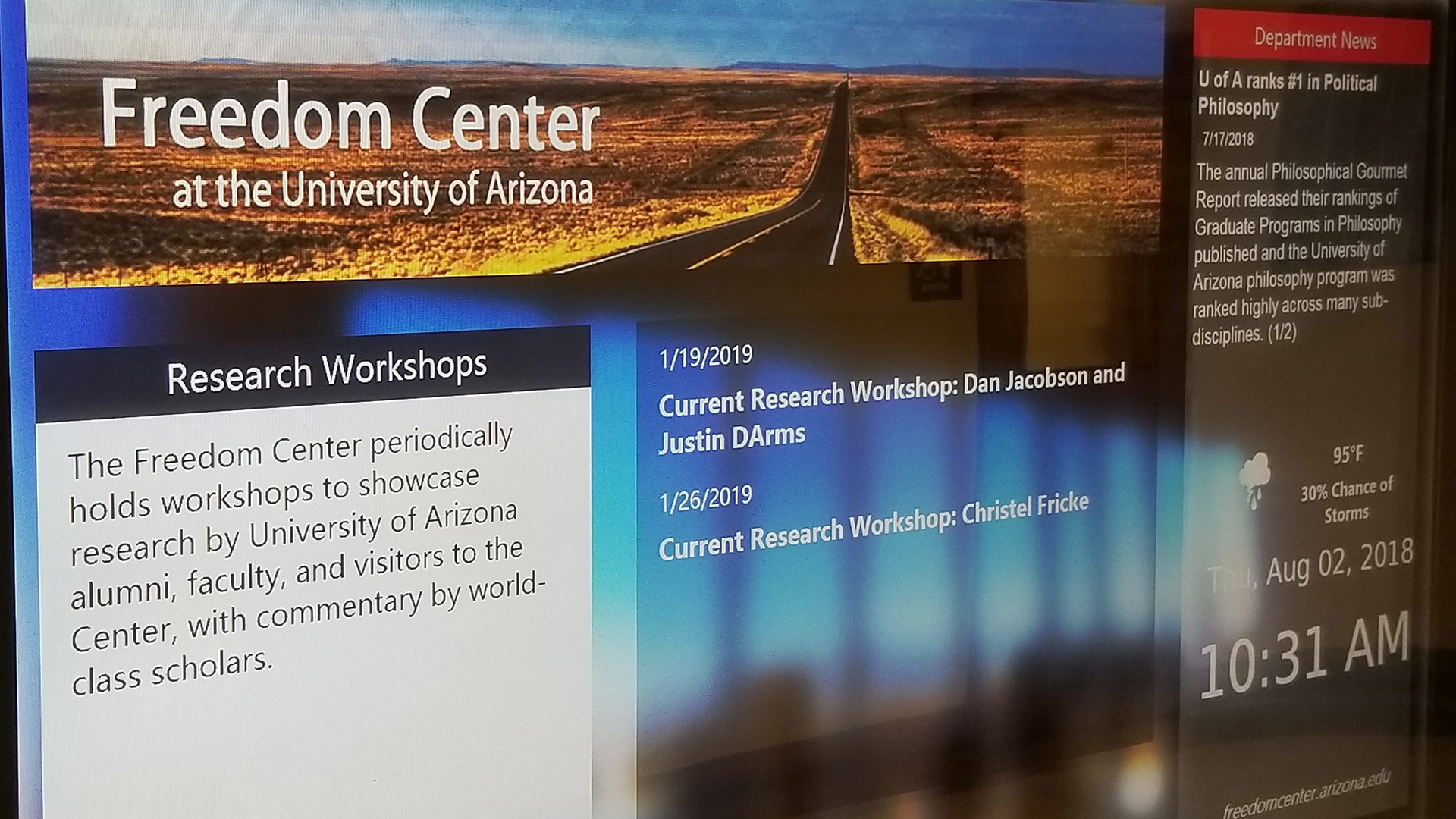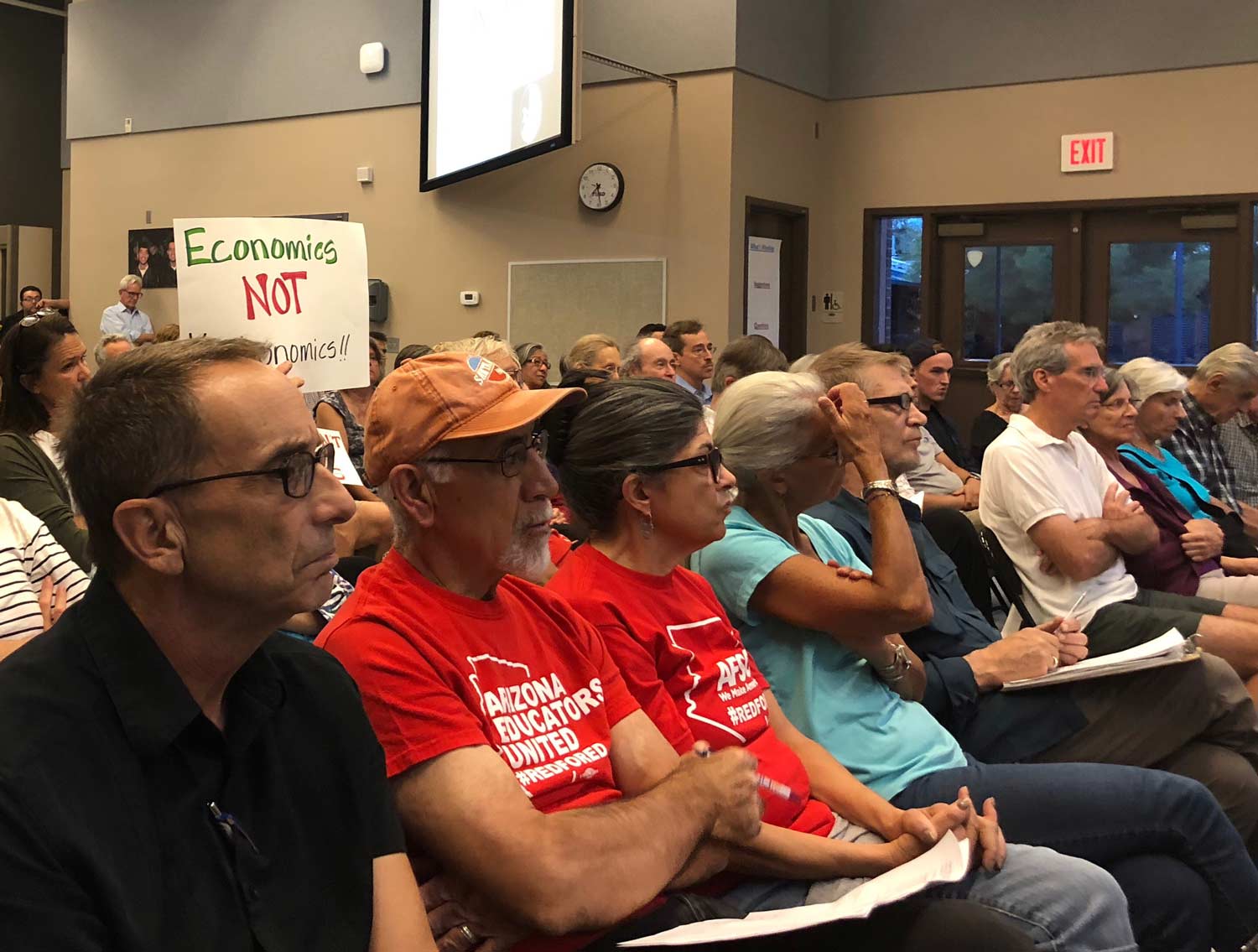 The textbook for Philosophy 101, "Ethics, Economy and Entrepreneurship."
The textbook for Philosophy 101, "Ethics, Economy and Entrepreneurship."
As the new school year begins for the Tucson Unified School District, one class will not be on the schedule. Philosophy 101, a course centered on ethics, economy and entrepreneurship, was removed from the curriculum after the school board found it wasn’t properly vetted, sparking a public controversy.
The course grew out of the University of Arizona Philosophy Department and offered high schoolers dual credit with the university.
David Schmidtz is a tenured professor in the UA Department of Philosophy and the creator and former director for the Arizona Center for the Philosophy of Freedom, otherwise called the Freedom Center, which is partially funded by Charles Koch. The Koch family has funded a number of conservative political campaigns and is considered influential in shaping conservative messaging.
In mid-February of 2014, Melissa Vito was serving as the senior vice provost for academic initiatives and student success at the University of Arizona. Schmidtz says Vito asked him to create the dual enrollment course in a telephone conversation between the two of them on Feb. 19, 2014.
He recounted that conversation this month to Arizona Public Media.
Schmidtz said the provost’s office was asking for a course to teach "bread-and-butter" economic concepts.
"They also said they want this course not be like a math course, but to be like a social studies course, or a philosophy course," Schmidtz said, "to have ethical reflection in it and to have historical reflection in it, to some degree."
For the course to be offered as a dual enrollment between high schools and the university, the staff teaching the course have to obtain a master's degree.
In a conversation between Dianne Horgan, the associate dean in the graduate college and Schmidtz, he was told how the program to obtain a masters degree could be approved for high school teachers.
"All you have to do is two things, first thing you have to do is get the courses approved so that the constituents of an overall program are in place, and that’s what [the provost's office has] to vet when we vet the program proposal," Horgan said to Schmidtz, according to Schmidtz. "The second thing you have to do is get the program approved first so there are courses to be proposed in the program."
Arizona Public Media’s attempts to confirm these details with the University of Arizona's provost office were not returned. After several attempts, a receptionist in the provost’s office referred Arizona Public Media to the UA's communications office and university spokesman Chris Sigurdson.
The role of the provost’s office is to make sure all of the courses and curriculum meet the expectations of the university and of its accrediting board, the higher learning commission, Sigurdson said.
He said he could not answer questions about whether the provost’s office solicited the course.
"I don’t think there was any way for us to know, I don’t have any knowledge of that. That’s not a question for me," Sigurdson said.
 Sign for the Freedom Center in the University of Arizona Social Sciences building. Aug. 2, 2018
Sign for the Freedom Center in the University of Arizona Social Sciences building. Aug. 2, 2018Kochs Off Campus is a nonpartisan activist group that fights to keep Koch brothers funding away from public education.
The group has been advocating against the Kochs' influence in the classrooms, saying courses funded by the Koch brothers are part of a right-wing political agenda, according to Kochs Off Campus activist Betts Putnam Hidalgo.
"As we know the course wasn’t authorized by the governing board and no one seems to have any record indicating what the approval process was prior to the governing board, which was never involved," Putnam Hidalgo said at a July board meeting.
Funding for the course never came from Charles Koch, according to David Schmidtz. The funding came through a grant from the John Templeton Foundation.
TUSD Governing Board member Mark Stegeman said he doesn’t recall the course going through the proper vetting process for TUSD.
"The first time it was offered it didn’t go through the board at all," Stegeman said.
Yet the course was taught at Rincon High School, Tucson High Magnet School, University High and Pueblo High School during the 2017-18 school year.
The course got the attention of the governing board last November. Since the yearlong course was already halfway completed at the time, TUSD voted in December to keep the course through the school year so students could obtain the credit.
But the board decided to evaluate the course before allowing it into this new school year. All textbooks are supposed to go through a 60-day district review, allowing the public to view the texts before they can be passed on to the governing board for a final approval.
"When it came to the board this time, the textbook had not gone through that process, which is odd," Stegeman said. "That is a policy, and the curriculum department must know that. That’s the policy but somehow it didn’t happen."
The textbook for the course is called Ethics, Economy and Entrepreneurship, and its written by Schmidtz, Cathleen Johnson and Robert Lusch.
At a governing board meeting filled with Kochs Off Campus activists in July, the TUSD board decided to send the textbook through the normal vetting process. The course will not be offered for the 2018-19 school year.
 Attendees at a July 10 TUSD Governing Board meeting expressed concern about the Philosophy 101 class being taught at some of the district's schools
Attendees at a July 10 TUSD Governing Board meeting expressed concern about the Philosophy 101 class being taught at some of the district's schools"I think we are doing ourselves a disservice by taking this opportunity away from students, which is clearly valuable, and they clearly benefit from, just because of the origin or the source of groups associated with the course, " Pueblo High teacher Patrick Peatrowsky said. He taught the course last year.
He says the yearlong course goes outside what the book covers. "It's my job as a teacher to provide some balance to my classroom. I mean, when you take an English class you don’t only read one book," he said.
Peatrowsky said he would like to see the course return to high schools in TUSD.
The same course is currently offered in the Sahuarita and Vail school districts.
TUSD decided last month it will meet with the course teachers from Tucson, Pueblo, Rincon and University high schools to gauge their thoughts on the course. The curriculum department will then choose whether or not it will take on the full verification process of the textbook.
Stegeman said he isn’t confident that process will happen.
"That was the board's excuse for postponing the issue. I think it would have been good to discuss it a little bit, but it was convenient for the board to kick the can down the road," Stegeman said.
If the textbook goes through the 60-day process, the board could be back at square one: deciding whether to offer the course for the 2019-20 school year.
Correction: This story was corrected on Aug. 15, 2018 to reflect the master's degree program and course approval conversation was between Dianne Horgan and David Schmidtz.
Editor’s note: This story was updated Aug. 13, 2018 to add detail about the provost’s office role in the course’s creation.

By submitting your comments, you hereby give AZPM the right to post your comments and potentially use them in any other form of media operated by this institution.